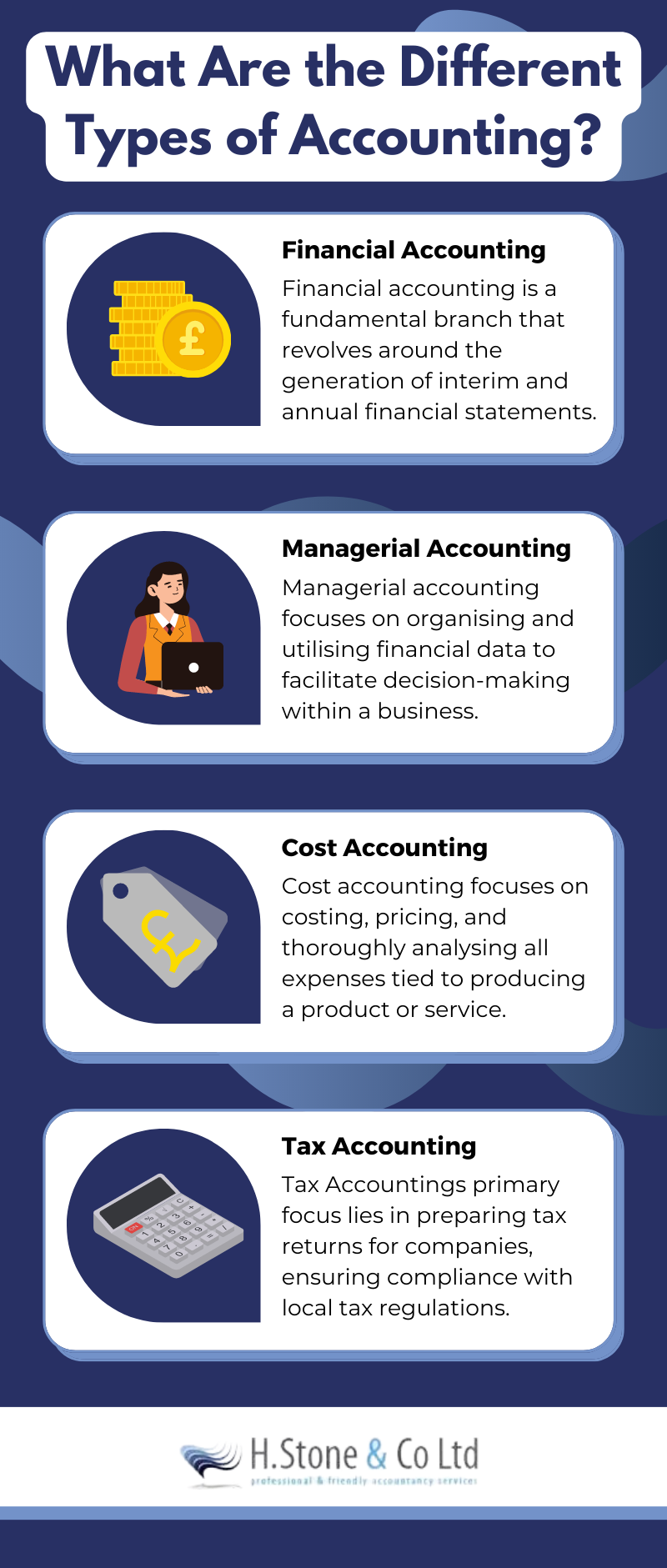What is main purpose of accounting? Learn how accounting serves as the backbone of financial management for businesses and individuals alike.
Madison Business Services Ltd provide accounting services throughout Cheadle Hulme, Manchester and Cheshire. From tracking financial transactions to providing insights for informed decision-making, we explain the fundamental role of accounting in managing, analysing, and optimizing financial health.
The role of accounting
Accounting serves as the "Language of Business," facilitating the effective communication of financial information to diverse users and enabling well-informed decision-making. Its overarching objectives encompass a wide array of vital functions that are instrumental in driving business success and efficient management.
At its core, accounting diligently records all financial transactions within a business, maintaining a systematic, accurate, and comprehensive record-keeping system. These transaction records form the bedrock of the accounting process, empowering business owners to retrieve and review crucial financial data whenever needed.
Budgeting and planning are crucial components of business management, presenting owners with the perpetual challenge of allocating limited resources – such as labour, machinery, equipment, and cash – to achieve strategic objectives. Through these processes, businesses anticipate needs and resources, fostering effective coordination across various organisational segments.

Accounting plays a pivotal role in the decision-making process, assisting owners in formulating policies that enhance business efficiency. Be it determining product and service prices, allocating resources for production, or identifying financing and growth opportunities, accounting information provides invaluable insights for making informed choices.
To gauge the success of a business, accounting generates reliable financial reports, measuring key performance indicators and allowing comparisons against past achievements and competitors' benchmarks.
Moreover, financial statements provide a comprehensive snapshot of a business's financial position, showcasing invested capital, funds utilisation, profits and losses, and overall assets and liabilities.
By determining a business's liquidity – its ability to meet financial commitments – accounting mitigates the risk of cash mismanagement, a common cause of small business failure.
Accounting empowers business owners to prepare historical financial records and future projections, essential for securing loans or investments to support business growth.
Through implementing internal controls, accounting helps avoid losses due to theft, fraud, errors, damage, obsolescence, and mismanagement, safeguarding business assets and long-term viability.
Additionally, legal requirements mandate businesses to maintain accurate financial records and share reports with stakeholders, tax authorities, and regulators, ensuring transparency and compliance.

Why Is Accounting Useful for Small Business Owners?
Accounting holds significant value for small business owners, particularly considering that poor financial management often leads to business failure, especially within the crucial first year of operation.
Given the typically limited budget and resources of small businesses, accounting plays a pivotal role in providing essential information to support their growth and development. Let's explore the reasons why accounting is indispensable for small business owners.
Effective cash flow management is vital to prevent businesses from running dry. By implementing policies for efficient record-keeping and sound financial strategies, small business owners can accurately track their cash flow and make informed decisions.
Cost accounting is essential for understanding fixed costs, and variable costs, and accurately costing projects. This enables small business owners to avoid losses on ventures they initially perceived as profitable, ensuring smarter decision-making about projects and pricing strategies.
Accounting empowers small business owners to grasp the overall health of their ventures. By learning to read and interpret financial statements, such as balance sheets, income statements, and cash flow statements, they gain a better understanding of their financial position and performance.
An additional advantage of accounting lies in its ability to detect and prevent fraud and theft by customers, employees, and suppliers. Implementing proper financial management systems creates safeguards against such risks.
Accounting also helps small business owners prepare for audits confidently. When they have a solid grasp of their finances and operations, they can face audits with ease and ensure compliance with regulatory requirements.
Having a clear understanding of their financial implications and a firm grip on business finances builds confidence with bankers and investors. Small business owners who demonstrate financial competence are more likely to gain the trust and support of financial institutions.
Furthermore, regular reviews of financial statements and detailed budgeting enable small business owners to identify operational inefficiencies and discover opportunities for cost savings. Saving even a little on several expenses can add up to significant results over time.

What Are the Different Types of Accounting?
Financial Accounting
Financial accounting is a fundamental branch that revolves around the generation of interim and annual financial statements. These statements, including the balance sheet, income statement, and cash flow statement, provide a comprehensive overview of all financial transactions that transpire during an accounting period.
For many companies, the accuracy and reliability of these financial statements are of paramount importance, prompting them to undergo an annual audit by external Certified Public Accountant (CPA) firms.
While publicly-traded companies are legally obligated to conduct audits, lenders also often require them as part of debt covenants. Consequently, most companies opt for annual audits to ensure compliance and instil confidence among stakeholders.
Managerial Accounting
In contrast to financial accounting, managerial accounting focuses on organising and utilising financial data to facilitate decision-making within a business's management team. Accountants specialising in managerial accounting generate regular reports, typically monthly or quarterly, that enable management to make informed operational choices.
This domain of accounting encompasses budgeting, forecasting, and the use of various financial analysis tools. Essentially, any financial information that can aid management in strategising and enhancing business operations falls under the purview of managerial accounting.
Cost Accounting
Cost accounting, as the name suggests, centres on decisions related to costing and pricing. It involves a comprehensive analysis of all costs associated with producing a product or service.
By understanding the intricacies of cost structures, analysts, managers, business owners, and accountants can determine appropriate pricing strategies for their offerings. Cost accounting treats money as an economic factor in production, as opposed to financial accounting, which views money as a measure of a company's economic performance.
Tax Accounting
Tax accountants operate within a distinct set of rules and regulations compared to financial accountants. Their primary focus lies in preparing tax returns for companies, adhering to local tax regulations.
Beyond ensuring compliance with reporting rules, tax accountants strategically manoeuvre to minimise a company's tax liability through thoughtful decision-making. Managing the entire tax process for a company, tax accountants oversee strategic organisation chart creation, operational considerations, compliance, reporting, and remittance of tax liabilities

Why Is an Accountant Important?
Accounting is a crucial aspect of a company's success, despite not involving direct customer interactions or product development. It plays a vital role in strategic planning, growth, and compliance requirements. Here's why accounting is of immense importance for businesses:
Firstly, accounting provides valuable insights for informed financial decisions and strategic planning. Analysing financial data allows businesses to identify top-selling products, departmental profits, and cost overheads affecting profitability.
Secondly, accounting attracts investor funding by showcasing a company's financial health. Potential investors request financial statements, including audits, to assess stability and growth potential. Similarly, lenders require compliant financial statements for debt financing.
Thirdly, accounting aids in owner transitions during acquisitions or mergers. Financial statements play a vital role in negotiations and enable owners to exit and receive compensation for their efforts.
Additionally, accounting ensures efficient payment management by tracking and facilitating timely payments to creditors and vendors, fostering positive business relationships and avoiding supply chain disruptions.
Moreover, accounting streamlines payment collection by monitoring customer debts and payment schedules, and optimising cash flow management.
Lastly, accounting meets regulatory obligations. Public companies issue compliant financial statements to avoid penalties or de-listing. Proper tax accounting is essential to avoid fines.
Get In Touch With our Tax Accountant Today
Are you looking for advice on accounting services in Cheadle Hulme and the surrounding areas of Manchester and Cheshire?
Follow the link below for professional accounting near you.


